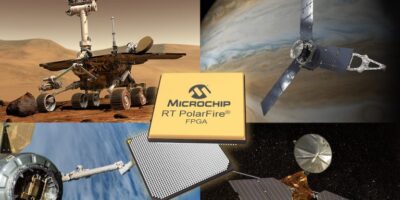Low-power rad-tolerant PolarFire FPGA meets spacecraft payload demands
Microchip has optimised the radiation-tolerant (RT) PolarFire PFGA to meet the most demanding requirements in spacecraft payload systems’ high-speed data paths with the lowest possible power consumption and heat generation.
RT FPGAs are used in spacecraft electronics to create on-board systems that for demanding space missions, survive the brutal launch process and continue to operate reliably in the harsh environment of space.
Greater computational performance is required to transmit processed information rather than raw data and make optimal use of limited downlink bandwidth. The RT PolarFire FPGA enables this at significantly lower cost and with faster design cycles than possible with ASICs, says Microchip. It also significantly reduces power as compared to the alternative of using FPGAs based on SRAM while eliminating their vulnerability to radiation-induced configuration upsets, adds the company.
The RT PolarFire FPGA is supported by all necessary radiation data, specifications, package details and tools customers need to start new designs now, initially with the commercial version of the device.
The RT PolarFire FPGA builds on the RTG4 FPGA, which has been deployed in space applications that require its radiation-hardening by design against single event upsets (SEUs) and inherent immunity to single event latch-ups (SELs) and configuration upsets. For space applications that require up to five times the computing throughput, the RT PolarFire FPGA provides 50 per cent more performance and triple the logic elements and serialiser-deserialiser (SerDes) bandwidth, Microchip reports.
It also provides six times the amount of embedded SRAM to enable more system complexity than previously possible using FPGAs and withstands total ionising dose (TID) exposure beyond the 100kRads that is typical of most earth-orbiting satellites and many deep-space missions.
The RT PolarFire FPGA cuts power consumption to approximately half that of alternative SRAM-based FPGAs with equivalent density and performance, claims Microchip. Its SONOS non-volatile technology enables its configuration switches to be implemented in a more power-efficient architecture with simplified, less expensive and lighter power system design, minimising heat dissipation to reduce thermal management problems. Designs are further simplified as compared to using SRAM-based FPGAs because the RT PolarFire FPGA eliminates the cost, complexity and recovery downtime of mitigating configuration SEUs.
The RT PolarFire FPGA will undergo the standard process for meeting QML standards including class V qualification for highly critical applications.
Packaged in a hermetically-sealed ceramic column grid array with integrated decoupling capacitors, the RT PolarFire RTPF500T FPGA will be available and qualified for space-flight deployment in 2021.
Customers can start designs now using the commercial PolarFire MPF500T FPGA with Microchip’s Libero software tool suite that includes optional triple mode redundancy (TMR) synthesis support for implementing SEU mitigation where required, such as in control circuits.
Development boards are available with the commercial PolarFire FPGA and will include the RT PolarFire device in engineering model form.




